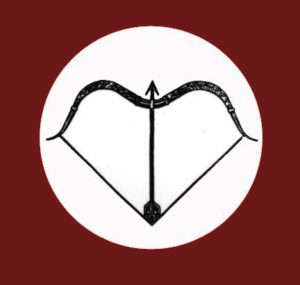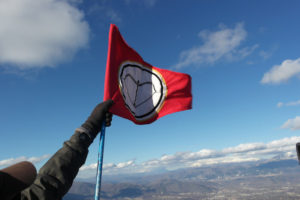
1. What is Raido?
On April 21st, 1995 the militant community of “Raido” was founded. However, before assuming this name, which means a hierarchy and a precise direction, for about two years Raido had been coordinating militants from various political backgrounds, institutional and non-parliamentarian, united by the sentiment that in the political movements the spiritual aspect and a true reference to Tradition were totally absent. Thus, in addition to having found the values of Tradition as the common place of reference, that initial coordination expressed a clear will: to establish a hierarchical body with respect to traditional Principles, placing at the centre the value of authority. Raido is therefore the expression of a community and militant action that has taken on the form of the Working Unity, or a school of life according to the teaching of Codreanu. By these words we mean a communitarian reality, open to the outside, in which confrontation – in all its expressions – between the militants inside and between them and the surrounding world outside, is sought as basis of self-check.
1.1 What do you represent politically and ideologically?
Before talking about “politics” or “ideology,” we want to clarify our goals. Our goal is, first and foremost, the rectification and qualification of the militants, that is, its formation. For us to develop means to put order in our own lifes, or even to “fulfill” it through concrete achievements: on the existential level (study / work, family, relationship with the other sex) and on the spiritual level by correcting the negative aspects of each one (egoism, individualism, hedonism and materialism), both of which do not differ within the community, political and social life in general.
In the latter case, the militant contributes directly to the activity of the community. Unlike modern structures, whether they are of liberal or marxist inspiration, militants act by themselves and reflect the reality around them. Raido’s militant is aware that the coherence between what is said that should be and what actually is, is made visible only through daily action. In three words, therefore, Raido’s goals are: Tradition, Formation, Revolution.
2. On which political tradition does your organisation reside? (E.g. are you inspired by the Roman Empire or by the post-Garibaldi Italy or both?)
Before any political reference, our absolute reference is to Tradition. The word tradition comes from Latin tradere, indicating an action of passage. About what? Of an inheritance, whose origin is not human but spiritual. Transmission of the Truth through the examples of men who throughout history have embodied a noble lifestyle. Transmission of a doctrine, as reported by authors such as Julius Evola and René Guénon. When we speak of Tradition, we do not refer to preservation or fixation on exterior forms or things, the meaning of which is no longer understood, nor do we refer to a specific religion. But we mean the action to convey, hand down and deliver directly and with reality a vision of the world, so that the correct action acquires a sense and the political militancy has a precise direction: the vertical one. For the tradition to be known, a deepening of the doctrine is required which, far from being useless intellectualism, must serve to confer awareness to the militant action. The latter point, which we will never be tired of repeating, remains the main measure of judgment: it is style and not titles, studies, or simply words, what makes a man, as well as his every-day behaviour. Tradition, therefore, is Action.
3. What are your ideological ties with traditionalism, racialism and metaphysical philosophy (esotericism)?
We have answered to this question above. However, it is not meaningless to explain, in the light of our intimate adherence to the idea of Tradition, what is our relationship with the term of “religion”. We distinguish between Tradition and Religion. Raido when dealing with whichever of the (legitimate) religions, has indeed no kind of foreclosure. Religion (from latin re-ligio, reconnect) is one of the ways through which men relate to the Sacred. Therefore, to understand the relationship between Tradition and Religion, we imagine a sort of great tree in which Tradition represents the main trunk while the various religious paths are the different branches origined by it, endowed with the same vital lymph. Therefore, any legitimate religion represents a link with Tradition, as a particular aspect of it. Having clarified this, it is clear why Raido does not embrace a specific religious way or engage in religious exclusivism but, rather, defends the legitimacy of a religious pathway against the modern phenomena of neo-spiritualism and atheism. So, as long as this is truly understood, any Raido militant is free to follow a religious path. And, thanks to this awareness, among our references we can consistently include the spirit of ancient Rome as well as the Japanese samurai, the chivalry orders of the Ghibellines of the Middle Ages as well as the Indian Bhagavad-Gita. It is not syncretism, nor exoticism, but the synthesis of a common idea and origin.

We will answer this question by clarifying what is our link and interest regarding the elections system and, more generally, with the idea of democratic representation: none at all. Raido, from this point of view, does not take part nor support the electoral competition. At any level whatsoever. This is coherent with an anti-democratic vision that characterizes us and according to which we cannot do otherwise. In fact from the Idea of Tradition, a hierarchical and aristocratic orientation is derived that has nothing to do with democracy and its institutions. Democracy bears the logic of compromise, and in the democratic politics rules the custom of exchanging favors. For the latter, the “quantitative” question is primary, while on the other hand we are convinced that votes don’t make strengh, which should rather be found in the existence of qualified militants. Raido, therefore, is in politics, but it does so to reawaken new forms of sensibility, free of the democratic fixations of the number, always as an instrument and never as the ultimate goal.
5. Do you believe there is an antidote for political correctness in Italy specifically and Europe in general?
In general, we are very sceptic regarding the possibility of improving the political and social situation in Italy and Europe. If you ask, “How does Raido intends to improve the system?”, we would answer that we have no ambitions nor concerns. Not to escape from the responsibilities of struggle and opposition to this world, in which we live and which we do not like at all. But simply because we do not want to face the system as “reformists”, but as “revolutionaries”, first of all towards ourselves, who, as men of today, are the artisans of this world. So, “no programs but new men”: this is, in our view, the right recipe to disintegrate the current system and rebuild a better world. Destroy everything to rebuild everything.
6. In which ways do your members experience in their everyday life tradition amongst the ruins of the modern world?
Raido, as a militant Community, is a Working Unit for the Front of Tradition. In this sense, it does not constitute an agglomeration of academics who lose themselves in the labyrinths of sterile intellectualism. It is school of life, according to traditional teaching, where the aim is the constant correction of the militant and affirmation of a virtuous style to act as an example.
Raido’s militant is aware that the coherence between what he is and what he does is only visible through a righteous action. Formation is achieved through the consolidation of concrete achievements on the existential level – study / work, family, relationship with the other sex – through the correction of negative aspects (egoism, individualism, hedonism and materialism) and through community work and the militant’s contribution to the activities of the group.
Unlike modern structures, whether they have liberal or marxist inspiration (for the purpose of modification of structures and proselytizing), militants act by themselves and only to reflect on the reality surrounding them. Specifically, Raido is organized by rhythmic commitments and deadlines, for which no disrespect or neglect is allowed, except for extraordinary causes. The community meeting bears a ritual significance, at a predetermined day and time of the week, as well as financially contributing with 10% of their monthly revenue, taking responsibility in order to measure the capacity for sacrifice and the availability of the individual to the “group” and to the Idea. Missed appointments, lack of punctuality, attachment to money or anything that is considered “personal” are not tolerated. The community is stern with those who are inconsistent with these rules, which are shaped in order to transmit order to action and “reshape” the individual from his pre-existing polluted state. During the meetings of militants, the duties assigned to each one are assessed, as well as the results and difficulties encountered for each militant. Also, the proposals and the prospects for improving the group’s activities are examined. In addition, clarifications are made on current events and the pursuit of doctrinal deepening takes place through the study of texts and traditional formation.
Regarding the activities, these are many of them: cultural and book center, music groups and events, hiking group and women’s group, solidarity activities and political-cultural collaborations with other groups in the Roman and Italian area in general, support to ex-combatants, summer and winter training camps, food distribution center to support small producers, etc. etc. Each initiative, on the one hand, is a legitimate economic structure on a militant basis and not for profit, on the other hand, is the instrument through which every militant conducts its own struggle for inner formation and diffusion of the Idea, so that, with spirit of abnegation, awareness and clarity of intent, he improves himself and, consequently, the world around him.
7. In your published works you give emphasis on the word “militante”. What does this word mean to you?
Corneliu Codreanu distingueshes two “races” amongst humans: the politician and the legionary (which is the “militant”).While the politician, through promises, demagoguery, and beautiful words, engages in proselytism to make others vote for him and support his party, the legionary behaviour is opposite. Acting in a righteous way, he does not make promises that he knows he can not keep and, above all, does not act embracing the logic of proselytism, but that of “recruitment”. Recruitment is, in the words of Codreanu, the effort to embody at a degree of 100% the values that we want to bring, with the objective of being an example and thus catalyzing the participation and the spontaneous interest of those who have a certain vision of the world. Regardless of whether these behaviors and values are in many or a few. Consequently, Raido operates as a rather rigid filter for joining the militant community, which aims for quality rather than quantity, with simplicity and humility. In essence, we do not seek to convince anyone, nor do we feel gratified by thinking of how many think as we do.
